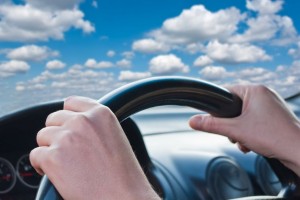A License to Love—but Not to Drive
 Photo by a7880s / 123RF
Photo by a7880s / 123RF It felt more like a cattle market than a driver’s license office. I stood in line and waited for different windows to open before I was finally told—three hours later—that the DMV wanted me to start over with a learner’s permit. Despite having a license to drive since I was 16, and being licensed to drive in five foreign countries, I might not be eligible to transfer any of my foreign licenses in exchange for a local driver’s license. I was angry, frustrated, and felt as if I was being penalized for living outside of the United States.
But my frustrations and troubles with the driver’s license office are miniscule when compared to the discrimination that has been placed upon the LGBTQ community for years. Last week, a lesbian couple in Texas faced an ordeal of their own when one partner was denied a State of Texas driver’s license because her name was legally changed through a same-sex marriage in California, which the State of Texas did not honor. Not only did California allow for her marriage and for her name to be changed on her driving license, her Social Security card was changed, demonstrating that even the U.S. Federal government allows such changes to be made with appropriate documentation.
This couple is not alone in the way they have been treated. In recent years, there have been instances of same-sex couples experiencing discrimination at other states’ driver’s license offices such as South Dakota, Georgia, Nebraska, Virginia, Michigan, Tennessee, and Florida. But states such as Illinois, Maryland, Washington, or Iowa do not make such discriminations. These discrepancies highlight that, since the 2013 US Supreme Court’s decision that the Defense Against Marriage Act of 1996 was unconstitutional, the issue of recognition and legal benefits of same-sex marriages are issues that individual states must decide for themselves. In solidarity with the LGBTQ community, on September 19, 2014 the American Humanist Association co-signed the Respect for Marriage Coalition’s letter to US Attorney General Eric Holder, asking that same-sex marriages in Arkansas, Indiana, and Wisconsin be federally recognized. (Interestingly enough, none of those three states explicitly forbid same-sex marriage name changes when applying for a driving license.)
Kevin Jagoe, the LGBTQ Humanist Council Coordinator, spoke out against the actions of the Texas Department of Public Safety (DPS): “The climate around LGBTQ rights in conservative areas of our country has moved from defensive to outright bullying. In places like Texas, where there are currently laws restricting the right to marriage, some government employees are now taking things beyond the law. To bar people from having legal documents like state identification with their legal name creates an environment of outright hostility. Our governmental offices should be about upholding laws and protecting citizen’s rights, not barring people from living their lives and building families.”
Rev. Dr. Stephen V. Sprinkle, professor of practical theology and supervisor of field ministry at Texas Christian University’s Brite Divinity School, and a long-standing advocate for LGBTQ rights, also expressed his disgust with the actions of the DPS: “Texas remains one of the most stubbornly obstructionist states in the union on the matter of equal treatment before the law for LGBTQ people, as this recent denial of a Texas driver’s license to a duly married lesbian in a same-sex couple demonstrates. The Department of Public Service has already been served notice by the action of a San Antonio judge that the Lone Star state’s ban on same-sex marriage is unconstitutional. This is on one level an issue between California and Texas, reflecting the worst of Texas conservatism and anti-LGBTQ bias. On another level, it is a denial of basic human rights, something that all Texans and Americans should be concerned about. The LGBTQ community and its allies will not sit by passively as this issue comes to a head. We LGBTQ people are watching DPS, and will vote accordingly in November.”
At the core of this issue, deep in the heart of Texas as well as in every other state that discriminates against the LGBTQ community, is that any policy that causes inequality impacts more than an individual. Having a driver’s license is more than just about motorist rules; it’s about selfhood, identity and recognition. Furthermore, with the ongoing concerns about showing positive state-issued identification at polling stations, an invalid driver’s license can also become a barrier to a person exercising their democratic right to vote.
Have you noticed the photograph of the couple in Texas? They have a young son who is also being affected by these decisions. I am certain that there are other same-sex families whose children have also felt the effects of the discrimination levied at their parents. Jagoe and Sprinkle have highlighted that government offices should be protecting, not obstructing, the rights of citizens so that they may freely live their lives. It should disturb us to consider that such ingrained bureaucratic obstructionism is having an unacceptable and unjust impact on families across our country.
